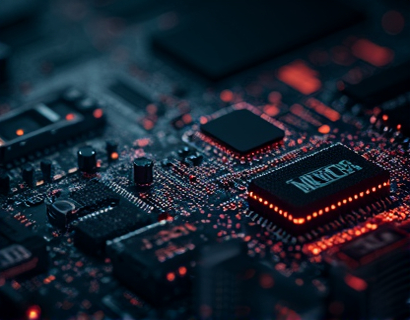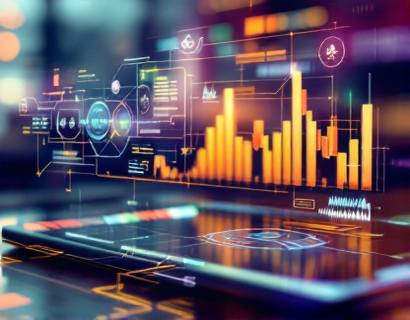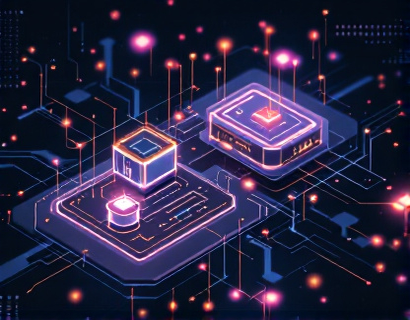Crypto AI Fusion: Elevating Productivity with Next-Gen Digital Solutions
The integration of cryptocurrency and artificial intelligence is ushering in a new era of digital productivity. This convergence is not just a technological curiosity but a transformative force that is redefining how we work, interact, and innovate. As we delve into the latest tools and applications at the intersection of crypto and AI, it becomes clear that these technologies are not only enhancing efficiency but also opening up new avenues for creativity and engagement.
The foundation of this digital revolution lies in the unique properties of blockchain technology and the computational power of AI. Blockchain provides a decentralized, secure, and transparent platform for transactions and data management, while AI brings intelligent automation, predictive analytics, and personalized experiences. When combined, these technologies create a synergy that amplifies their individual strengths, leading to unprecedented levels of productivity and innovation.
Understanding Crypto AI Tools
Crypto AI tools are designed to leverage the power of both blockchain and artificial intelligence to solve complex problems and streamline processes. These tools can range from smart contract optimization to predictive maintenance in industrial settings. One of the key applications is in the realm of finance, where AI algorithms can analyze vast amounts of market data to make informed investment decisions, all while ensuring transactions are secure and transparent on the blockchain.
For instance, AI-driven trading bots can execute trades based on real-time market analysis, reducing human error and increasing the speed of decision-making. These bots can operate 24/7, providing a competitive edge in the fast-paced world of cryptocurrency trading. Moreover, the use of machine learning algorithms helps in identifying patterns and trends that might not be immediately apparent to human analysts, further enhancing the accuracy of predictions.
Enhancing Productivity with AI-Powered Crypto Applications
One of the most significant impacts of Crypto AI fusion is in the area of productivity tools. Traditional productivity software can be enhanced with blockchain and AI to offer more secure, efficient, and personalized experiences. For example, AI-powered project management tools can predict project timelines, allocate resources more effectively, and even anticipate potential bottlenecks before they occur. This proactive approach ensures that projects stay on track and meet their deadlines with minimal disruption.
Another area where Crypto AI is making waves is in digital identity and access management. By using blockchain to store and verify identity credentials, AI can streamline the authentication process, reducing the need for cumbersome passwords and enhancing security. This not only improves user experience but also reduces the administrative burden on organizations, allowing them to focus on core business activities.
Innovative Use Cases in Various Industries
The applications of Crypto AI extend beyond finance and project management, impacting a wide range of industries. In supply chain management, for example, blockchain ensures transparency and traceability, while AI can optimize logistics and inventory management. This combination reduces costs, minimizes waste, and improves overall efficiency. Companies can gain real-time insights into their supply chains, enabling them to make data-driven decisions and respond quickly to market changes.
In the healthcare sector, Crypto AI can enhance patient data security and interoperability. Blockchain can securely store and share medical records, ensuring that patient data is tamper-proof and accessible only to authorized personnel. AI algorithms can analyze this data to provide personalized treatment recommendations, predict disease outbreaks, and optimize resource allocation in hospitals. This not only improves patient outcomes but also reduces operational costs for healthcare providers.
Challenges and Considerations
While the potential of Crypto AI is vast, there are several challenges and considerations that need to be addressed. One of the primary concerns is the regulatory landscape. As these technologies are relatively new, regulations are still evolving, and compliance can be a complex issue. Organizations must stay informed about local and international regulations to ensure they are operating within legal boundaries.
Another challenge is the technical complexity involved in integrating blockchain and AI systems. Developing and maintaining these solutions requires a high level of expertise, which can be a barrier for some businesses. However, as the ecosystem matures, more user-friendly tools and platforms will emerge, making it easier for a broader range of users to adopt these technologies.
Future Trends and Opportunities
The future of Crypto AI is bright, with numerous trends and opportunities on the horizon. One of the most exciting developments is the rise of decentralized applications (dApps) that combine the power of blockchain and AI. These dApps can offer decentralized versions of traditional services, such as social media, gaming, and e-commerce, with enhanced security and user control. The decentralized nature of these applications also opens up new possibilities for community-driven innovation and governance.
Another trend is the increasing adoption of edge computing in Crypto AI solutions. By processing data closer to the source, edge computing reduces latency and improves the performance of AI algorithms. This is particularly beneficial for real-time applications, such as autonomous vehicles and smart cities, where quick decision-making is crucial.
Furthermore, the integration of quantum computing with Crypto AI holds the promise of solving problems that are currently intractable. Quantum algorithms could significantly speed up AI computations and enhance the security of blockchain networks, leading to breakthroughs in fields like cryptography and materials science.
Conclusion
The convergence of cryptocurrency and artificial intelligence is revolutionizing the way we approach productivity and innovation. By leveraging the strengths of both technologies, we can create more secure, efficient, and intelligent systems that drive progress across various industries. As the ecosystem continues to evolve, it is essential for tech enthusiasts and professionals to stay informed and embrace these transformative tools. The future is not just promising; it is already here, and the possibilities are endless.










































